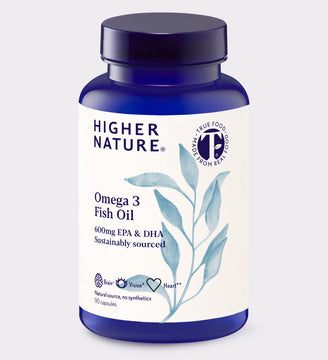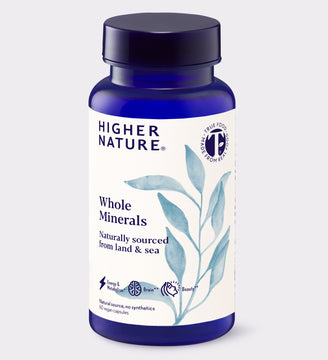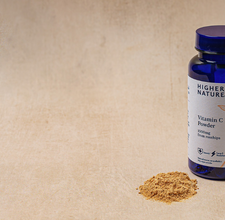
Focus on Fibromyalgia
Elizabeth Houston - Higher Nature Nutritional Therapist - Dip BCNH mbant mCNHC
Fibromyalgia is a chronic (long-lasting) disorder that causes pain and tenderness throughout the body, as well as fatigue and trouble sleeping. This little understood condition is surprisingly common and although it may occur in both men and women, it seems that women experience it more frequently than men. It is a condition characterised by chronic widespread pain in joints and muscles. It is often accompanied by fatigue, disrupted sleep, decreased muscle strength and mood disturbances.
Fibromyalgia may also be present alongside other conditions including migraine, arthritis, irritable bowel syndrome, depression and chronic fatigue syndrome. It is not fully known why some people develop fibromyalgia. There are no tests to definitively confirm a diagnosis. As a result, fibromyalgia is often misdiagnosed.
Tender points
Symptoms usually include areas of pain known as tender points, specific areas of pain that are near the joints but are not the joints themselves. These points hurt when you press on them and are thought to be caused by local muscle spasms. Common areas of pain include, back of the head, tops of the shoulders, upper chest, outer elbows, hips, knees and back.
Fibromyalgia is similar to chronic fatigue syndrome with some key differences. They’re both considered central sensitivity syndromes, with both involving fatigue, pain, and cognitive dysfunction.
Chronic fatigue syndrome (also called myalgic encephalomyelitis or ME/CFS) is more often tied to immune-system abnormalities than fibromyalgia. Fibromyalgia is generally more painful than ME/CFS.
But both conditions affect multiple systems in the body. They’re sometimes referred to as neuro-immune or neuroendocrine immune disorders to reflect that.
Inflammation and antioxidant status
Those with fibromyalgia have been found to have an increase in a compound called Substance P. This neuropeptide is thought to be involved with inflammatory processes and pain, and increased levels may cause enhanced perceptions of pain. It has also been found that co-enzyme Q10 levels may be low in sufferers and they may have an increase in oxidative stress, which is an imbalance between the damaging effect of oxidised molecules and natural protection against them.
Stress
Stress is also a factor in fibromayalgia and quite frequently low levels of the stress hormone cortisol are found. Cortisol plays a role in regulating inflammation, the sleep-wake cycle, memory and blood sugar balance. As stress regulation may be an issue, stress supportive nutrients may be of use. These nutrients include vitamin C, magnesium and B vitamins as they are all readily used during stressful times. Vitamin B5 (pantothenic acid) is required for the production of anti-stress hormones. The herbs rhodiola and ashwagandha are known as adaptogenic herbs, these offer support during times of stress and is traditionally used to relieve symptoms associated with stress such as fatigue, exhaustion and anxiety.
Mood
Mood issues are often an issue in fibromyalgia and altered serotonin levels may be associated with the condition. In particular, research has shown that those with fibromyalgia may have lower levels of tryptophan, an amino acid required for serotonin synthesis. Low tryptophan levels have been directly linked to low mood foods high in tryptophan include turkey, chicken nuts, eggs and oats. The omega 3 essential fatty acids EPA and DHA have also been found to support mood patterns as well as reducing inflammation eating oil fish at least 3 times a week (think SMASH- salmon, mackerel, anchovies, sardines and herring) will provide adequate amounts of these fats or if you preferyou could add an high strength supplement.
Sleep
Sleep disruption is common and often those with fibromyalgia can wake up feeling unrefreshed. Getting a good night’s rest is essential for good health. Nutrients such as magnesium help muscles relax. Good bedtime hygiene is essential, for more information please see our sleep article.
Gentle movement
Start slowly with short walks and build up only if you feel able to do so. It’s really important to rest when your body tells you to! Slower paced exercise may be helpful such as Tai chi and gentle yoga may be beneficial.
Vitamin D
Vitamin D status may also be important and low levels can frequently be seen in fibromyalgia. In fact, studies have indicated that vitamin D deficiency may contribute to fatigue and the severity of the condition. Vitamin D supports normal muscle function and contributes to the normal function of the immune system.
Although there are many factors involved in the development of fibromyalgia, nutritional solutions are available to offer support for many of the symptoms.
Co enzyme Q10
Clinical research in women with fibromyalgia shows that taking coenzyme Q10 orally daily for 40 days to 3 months improves pain by 24% to 56%, fatigue by 22% to 47%, sleep disturbances by 33%, morning tiredness by 56%, and tender points by 44% when compared with placebo.
Magnesium
One small clinical study shows that taking magnesium 300 mg daily for 8 weeks improves some symptoms of fibromyalgia, such as number of tender points and depression, when compared to baseline, there is also evidence showing magnesium can help with stress, anxiety and chronic fatigue by supporting cellular energy production. Magnesium is often used for aiding a restful night sleep as it help relax muscles.
5htp
5HTP can be converted in the body into serotonin and melatonin. Small clinical studies in people with primary fibromyalgia syndrome suggest that taking 5-HTP daily for 30-90 days might improve pain, tenderness, sleep, anxiety, fatigue, and morning stiffness when compared with baseline or placebo.
Diet
A diet to help lower inflammation can help various symptoms. This includes eating a high variety of different vegetables and fruits such as berries and cherries, oily fish and healthy fats such as virgin olive oil and avocados. Have very little red meat, processed foods, sugar and refined carbohydrates. Spices such as turmeric and ginger should be included and foods that encourage gut health such as bio live yoghurt, kefir, kimchi and sauerkraut.
There is also a link between Fibromyalgia and intestinal permeability (leaky gut). For more information on leaky gut please click here.


















